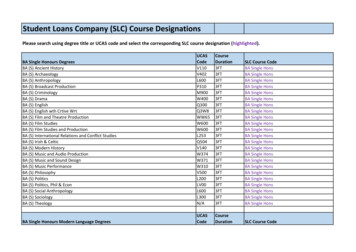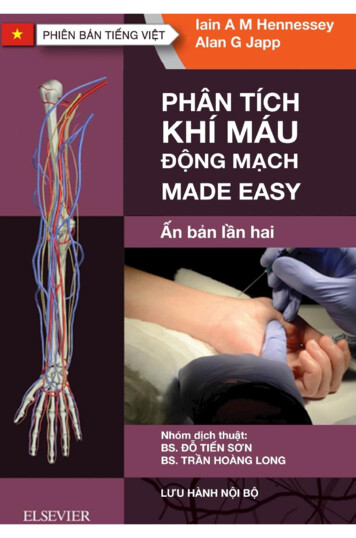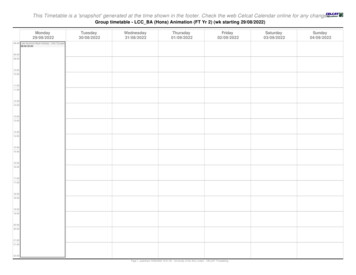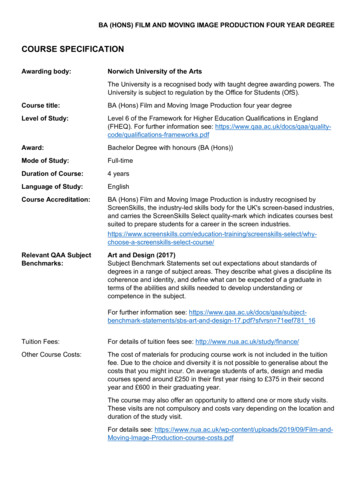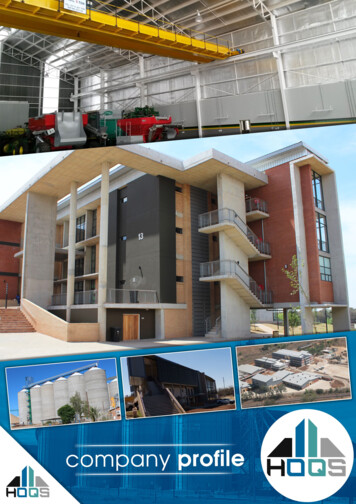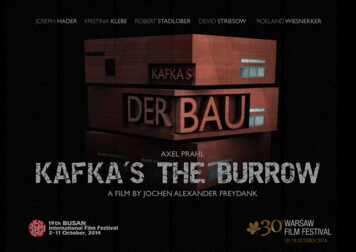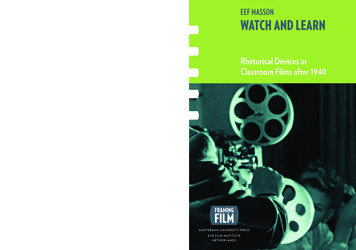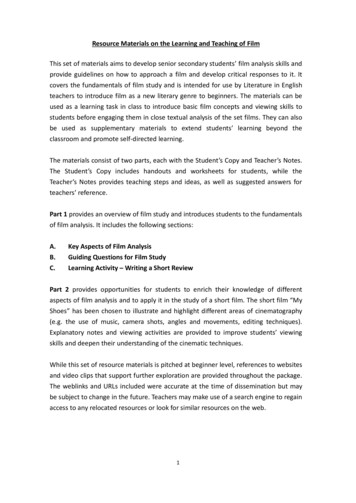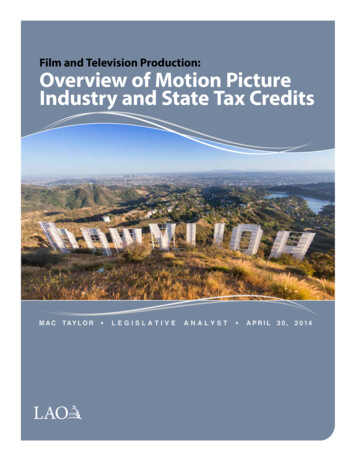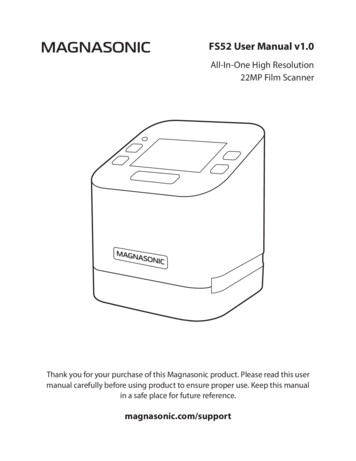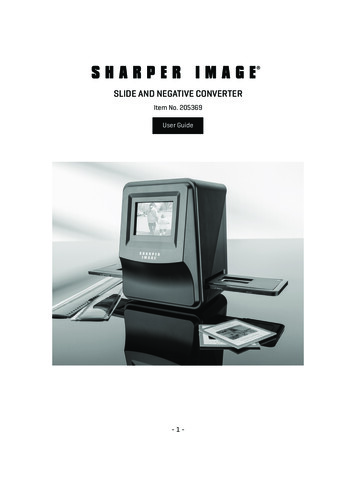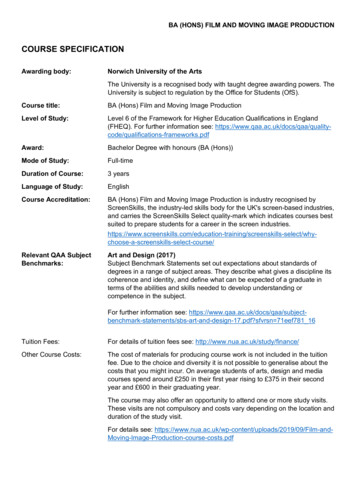
Transcription
BA (HONS) FILM AND MOVING IMAGE PRODUCTIONCOURSE SPECIFICATIONAwarding body:Norwich University of the ArtsThe University is a recognised body with taught degree awarding powers. TheUniversity is subject to regulation by the Office for Students (OfS).Course title:BA (Hons) Film and Moving Image ProductionLevel of Study:Level 6 of the Framework for Higher Education Qualifications in England(FHEQ). For further information see: cations-frameworks.pdfAward:Bachelor Degree with honours (BA (Hons))Mode of Study:Full-timeDuration of Course:3 yearsLanguage of Study:EnglishCourse Accreditation:BA (Hons) Film and Moving Image Production is industry recognised byScreenSkills, the industry-led skills body for the UK's screen-based industries,and carries the ScreenSkills Select quality-mark which indicates courses bestsuited to prepare students for a career in the screen lls-select-course/Relevant QAA SubjectBenchmarks:Art and Design (2017)Subject Benchmark Statements set out expectations about standards ofdegrees in a range of subject areas. They describe what gives a discipline itscoherence and identity, and define what can be expected of a graduate interms of the abilities and skills needed to develop understanding orcompetence in the subject.For further information see: atements/sbs-art-and-design-17.pdf?sfvrsn 71eef781 16Tuition Fees:For details of tuition fees see: http://www.nua.ac.uk/study/finance/Other Course Costs:The cost of materials for producing course work is not included in the tuitionfee. Due to the choice and diversity it is not possible to generalise about thecosts that you might incur. On average students of arts, design and mediacourses spend around 250 in their first year rising to 375 in their secondyear and 600 in their graduating year.The course may also offer an opportunity to attend one or more study visits.These visits are not compulsory and costs vary depending on the location andduration of the study visit.For details see: ilm-andMoving-Image-Production-course-costs.pdf
BA (HONS) FILM AND MOVING IMAGE PRODUCTIONADMISSION REQUIREMENTSEntry Requirements / Interview/ Portfolio:When you apply to the BA (Hons) Film and Moving Image degree at NUA, we will ask you to send in yourportfolio digitally and a written submission. These methods are used to assess your suitability to the course.These elements should clearly demonstrate your passion for the subject and your individual creativity.Detailed information regarding entry requirements and portfolio guidance can be found age-production/#tabs-portfolioguidanceAIMS AND OUTCOMES OF UNDERGRADUATE STUDYThe Aims of Undergraduate Study are to: Provide students with an inclusive and stimulating curriculum for the specialist study of art, design,architecture and media.Maintain and nurture a commitment to intellectual and personal development as a basis for alifetime of learning and professional practice.Provide students with opportunities for innovative, imaginative and intellectually rigorousopportunities for creative practice along with skills appropriate to the named award.To enable students to establish and develop key skills in areas of creative practice, research andprofessional practice as they apply to the subject.Provide students with the required practical and project management skills to realise ideas.Provide courses that prepare students for employment and professional practice and/or furtherstudy.Provide courses that enable graduates to make a useful contribution to the social, economic andcultural life of the region and beyond.Enrich curriculum content and ensure course currency through the professional practice, researchand scholarship of staff.Emphasise the cultural, technical and vocational relevance of course provision.Develop effective collaborations with the creative and cultural industries, professional bodies, otherHEIs and wider art, design, architecture and media communities.
BA (HONS) FILM AND MOVING IMAGE PRODUCTIONGENERIC SKILLSHolders of Undergraduate Awards will: Have developed the skills to embark on a professional career or further course of study in a relatedfield.Demonstrate a professional approach and work towards achieving their full potential as a creative ortechnical practitioner.Possess the qualities and transferable skills necessary for employment and progression to otherqualifications assuming personal responsibility and decision-making.Be digitally literate in relation to the skills essential for professional practice and its representations.Be able to locate their work within relevant professional, cultural and historical frameworks.Be able to practice professionally in an area appropriate to their subject skills and expertise.Have developed the capacity to critically examine the context within which their practice is based.Be able to analyse information and experience to formulate and present reasoned arguments.Have an understanding of the extent of their knowledge, and how this influences analysis andinterpretation based on that knowledge in their area of practice.Be able to interpret and communicate their practice using spoken, written and visual language.Be able to work flexibly to manage change and uncertainty.Be able to work independently and collaboratively while having regard to the views and needs ofother stakeholders.Have developed the ability to make effective use of processes and materials appropriate to thesubject.Be able to work with due regard to Health and Safety, Ethics, Sustainability and Risk Assessmentconsiderations as they apply in in a range of professional contexts.COURSE DIAGRAMBA1a: Creative LearningBA1b: Explore and Experiment40 Credits80 Credits10 Weeks20 WeeksBA2a: Global ContextsBA2b: Collaboration80 Credits40 Credits20 Weeks10 WeeksBA3a: Research andPreparationBA3b: Resolution and Career Development40 Credits80 Credits10 Weeks20 Weeks
BA (HONS) FILM AND MOVING IMAGE PRODUCTIONCOURSE OVERVIEWYou will be making films from week one and set-ready by the time you graduate when you join our BA(Hons) Film and Moving Image Production degree, accredited by ScreenSkills.We will encourage you to explore a variety of filmmaking mediums and platforms to become anaccomplished and creative storyteller.You’ll learn by doing as you become a flexible, multi-skilled collaborator with technical and craft skillshighly-prized by industry.You’ll explore how the production skills you use and creative choices you make can shape and change thestory you are telling.Script to screenYour focus will be the short film form, including:oOriginal and adapted dramaoDocumentaryoAdvertisingoCommercial editorial work.You’ll play a range of production roles as you learn fundamental skills, including:oScript writingoProducingoDirectingoCinematography and editingoSound recording and sound designoProduction design.Film production and releaseEntrepreneurial skills won’t take a back seat, as you pitch films to professional visitors, explore filmmarketing and distribution strategies, including festival and contest entries, as well as online platforms.And you’ll make full use of the industry networks associated with the course, attending craft workshops withleading writers, directors, producers, production designers, sound designers and cinematographers.The final year provides opportunities to write, produce or direct an original short film and submit it forselection for a special industry screening.There’s also the potential for international exposure through online screenings and NUA’s degree show.
BA (HONS) FILM AND MOVING IMAGE PRODUCTIONGraduates work in a broad range of careers includingooDirectoroCamera OperatoroProduceroLocation ManageroDirector of PhotographyoArt DirectoroEditoroProduction DesigneroSound DesigneroScreenwriteroAssistant DirectoroScript SupervisorYou’ll also get specialist creative careers advice from our Careers Team in the Ideas FactoryNUA tohelp support you as you plan your career.
BA (HONS) FILM AND MOVING IMAGE PRODUCTIONCOURSE CONTENTYear 1 Develop your storytelling skills and your fundamental creative craft skills such as producing, scriptdevelopment, direction, cinematography, sound, editing and colour grading. Learn industry standard approaches to the filmmaking process including pre-production, productionand post-production Work in production teams on a range of practical projects including visual narrative, dramaadaptation, sound design and production design Interview and write a case study about a person currently working in the film industry Produce individual supporting research and documentation in the form of a research and preproduction blog.Year 2 Further develop industry awareness and storytelling skills, working on briefs with industry clientsand experts Consolidate skills and knowledge in the wider context of film forms, including documentary andadvertising films, alongside different forms of drama Develop collaborative working skills on projects with students on other courses, as well as workplacement opportunities and live industry projects.Year 3 Produce, direct, shoot and post-produce a short film Receive feedback and advice on your film from a panel of professionals working in the film industry Receive support to develop a five-year employability plan, including plans to seek out industryplacements, internships, mentors and employment, as well as ways to develop your final film forfestival (contest) submission Write a Research Report on an area of film production, culture or audience that reflects yourinterests.
YEAR 1 UNIT: BA1aYear 1 Unit: BA1aUnit Title:Creative LearningReference:BA1aYear:1Credit Points:40Duration:10 WeeksStudy Time:320 HoursDescriptionThis unit will introduce you to the University’s resources and campus and help you to understand thefundamentals of studying on a degree course. Within the unit you will learn skills relevant to your subjectand have opportunities to explore and experiment.You will be introduced to cultural, sustainable and ethical concepts that influence, and are influenced by,creative practice. You will be looking at methods for gathering information and investigate the ways inwhich that information can be interpreted. You will practice presentation techniques and consider how bestto communicate your ideas through the presentation of your work.The unit will help you to develop skills towards becoming an independent learner, i.e. someone with theability to use initiative to advance their skills, knowledge and understanding and take responsibility for theirown education.Topics covered in this unitCreative PracticeGetting inspiration andideasLearning technical skills andexploring materials andprocessesOrganising and presentingworkResearch andCommunicationHow to research and why itis importantGathering and interpretinginformationCareers andEmployabilityGetting the best from theUniversity and your studiesPlanning your timeCommunicating your ideasHealth and Safety AwarenessIn this unit we aim to support you in: Familiarising yourself with the University and what it has to offerDeveloping creative and practical skills in your subjectLearning the importance of research and how to gather and interpret informationGaining an understanding of the wider influences and challenges related to your discipline
Learning OutcomesYEAR 1 UNIT: BA1aUpon successful completion of this unit, you will be able to:LO1: Use RESEARCH skills to find out about the influences on your subjectLO2: Show an EXPLORATION of the fundamental techniques, processes and concepts related to yoursubjectLO3: Show that you have DEVELOPED SKILLS and KNOWLEDGE that are key to your studiesLO4: Present work in an organised way which COMMUNICATES your ideas and development throughoutthe unitAssessment RequirementsYou are required to submit all the following for assessment: Body of creative workSupporting documentationReflective Learning Summary
YEAR 1 UNIT: BA1bYear 1 Unit: BA1bUnit Title:Explore and ExperimentReference:BA1bYear:1Credit Points:80Duration:20 WeeksStudy Time:680 HoursDescriptionIn this unit you will explore and experiment with techniques, materials and media. You will learn howiterative processes allow you to develop and refine your work. There will be a focus on awareness ofsustainable and responsible ways of thinking and working which will become embedded in your practice asyou progress through the course.Developing your understanding of the key concepts and challenges that exist for your subject and how theymay be addressed is an essential aspect of the unit. You will be introduced to past and present influenceson society and be encouraged to map them against the movements, styles, genres and theories associatedwith your creative discipline.Understanding the importance of research and how evidence can give weight to your ideas and opinions iscentral to your degree course. We will explain how to gather relevant information, analyse your findings andcommunicate what you have discovered in writing, with images and verbally.You will find out about some of the possible careers you may go into and the businesses and organisationswho may become your employers. We will support you in developing the transferable skills required bygraduate roles, in particular: planning, organisation and working as part of a team.Topics covered in this unitCreative PracticeExplore and experimentwith techniques andprocessesDeveloping subject-specifictechnical and practical skillsUsing an iterative approachto evaluate your workEthical and sustainablepracticesCritical reflection andevaluationResearch andCommunicationUnderstanding key cultural,social and historical issuesCareers andEmployabilityTeam working and sharedresponsibilitySelecting, gathering andevaluating informationAnalysing images andobjectsEffective writing for a varietyof audiencesIndustry awarenessPresentation skillsOrganisation and projectplanningUnderstanding Health &Safety issues
In this unit we aim to support you in: YEAR 1 UNIT: BA1bGaining specialist skills in your disciplineDeveloping your approach to independent learning, planning, organisation and time managementGaining knowledge of some of the key influences on your subject and how to interpret themDeveloping an awareness of social and economic concerns that help to inform an ethical andsustainable practiceExploring and experimenting using iterative processes to help solve problems and generate ideasDeveloping skills in visual, written and oral communicationLearning how to work effectively with others as part of a teamLearning OutcomesUpon successful completion of this unit, you will be able to:LO1: Show SPECIALIST KNOWLEDGE of your discipline and issues of SUSTAINABILITY that relate to itLO2: Use RESEARCH skills to find out about the historical and cultural influences on your discipline andINTERPRET your findingsLO3: Use an ITERATIVE approach to SOLVE PROBLEMS using relevant techniques, processes andconceptsLO4: COMMUNICATE your ideas and what you have learnt in an organised, structured and consistentwayLO5: Show how you have used INDEPENDENT LEARNING to identify your training needs andDEVELOPED SKILLS necessary to become proficient in your disciplineLO6: Show that you have developed an understanding of key CAREER and EMPLOYABILITY SKILLSand the RESPONSIBILITIES of working as part of a teamAssessment RequirementsYou are required to submit all the following for assessment: Body of creative workSupporting documentationReflective Learning SummaryResearch Essay (2,000 words)Group presentationIndustry folder
YEAR 2 UNIT: BA2aYear 2 Unit: BA2aUnit Title:Global ContextsReference:BA2aYear:2Credit Points:80Duration:20 WeeksStudy Time:680 HoursDescriptionThis unit will enable you to expand your specialist knowledge and skills and help you to identify areas forpersonal development through independent study. You will be asked to consider your work in differentways and how it is situated within a global context. You will be expected to advance your understanding ofthe challenges faced in protecting and improving the world we live in, and consider how your practice canbe used to raise awareness and solve problems.We will help you develop your critical evaluation skills and encourage reflection on your creative practice interms of the professional, commercial, ethical, sustainable and contextual influences that surround it. Theunit will support you to continue to develop your research, analysis and communication skills, exploringwriting for different audiences, how to develop an argument and presenting your findings succinctly.The unit supports you in making considered decisions about your future career through engagement withindustry such as competition entry, working with live briefs and/or other forms of work-related learning suchas work placements. You will prepare for employment opportunities by developing relevant self-promotionalmaterials such as a CV, web site and/or professional social media presence.Topics covered in this unitCreative PracticeDeveloping and advancingtechnical skillsIdentifying and proposingsolutions to problemsrelated to social, ethical andglobal challengesDiversity andexperimentation in materialsand processesConsidering a variety ofcontexts and audiences foryour workResearch andCommunicationIdentifying and adoptingappropriate researchsources and methodsEvaluating evidenceCareers andEmployabilitySelf-promotion andpreparation for employmentIdentifying and applyingappropriate theories andconceptsWork-related learning,competition entry, live briefsand/or opportunities topromote your workRisk assessments andprofessional Health andSafety considerationsPersuasive written andverbal communicationUnderstanding the creativeand cultural economy
In this unit we aim to support you in: YEAR 2 UNIT: BA2aDeveloping a breadth and depth of experimentation and the application of techniques, processesand materialsGenerating ideas and considering how to identify and solve problems related to your practice andwider global challengesGaining an understanding of a range of research methods relevant to your discipline and developingyour understanding of their applicationIdentifying and applying relevant theories and ideas to your practiceCommunicating and presenting ideas to different audiences clearly and persuasivelyLearning OutcomesUpon successful completion of this unit, you will be able to:LO1: Use SPECIALIST KNOWLEDGE and skills relevant to your discipline, showing how you haveapplied SUSTAINABLE approaches to the production of your workLO2: Show how you have used ITERATIVE processes to identify and put into practice appropriateapproaches to creative PROBLEM SOLVINGLO3: EVALUATE your practice and how it can be APPLIED to a range of audiences in wider globalcontextsLO4: Show that you have used the processes of INDEPENDENT LEARNING and REFLECTIONeffectively in identifying the influences and possible interpretations of your workLO5: Use RESEARCH and COMMUNICATION to substantiate and explain the decisions you have madein producing your work to advance your studiesLO6: Use CAREERS and EMPLOYABILITY SKILLS to identify the potential careers and roles that matchyour interests and abilitiesAssessment RequirementsYou are required to submit the following for assessment: Body of creative workSupporting documentationReflective Learning SummaryWritten report (3,000 words)Personal planning folder
YEAR 2 UNIT: BA2bYear 1 Unit: BA2bUnit Title:CollaborationReference:BA2bYear:2Credit Points:40Duration:10 WeeksStudy Time:320 HoursDescriptionThis unit focuses on helping you to understand your practice in a wider context through collaboration andinterdisciplinary working, with the opportunity to test different working practices. You may, for example, getinvolved in collaborations within your course which explore generic team-working skills, cross-coursecollaborations and/or collaborations with industry. Working with other groups will help you to understandyour own discipline from alternative perspectives and allow you to learn new skills and gain knowledge fromcolleagues. Team-working, project management and the ability to communicate effectively with a variety ofstakeholders are essential skills that you will develop as part of this unit.This unit will equip you with the skills to identify the intended focus of your practice and career and becomea more autonomous learner in preparation for your final year of study. You will complete a Research ReportProposal to help you to identify research questions and appropriate methodologies. You will develop anunderstanding of the debates in and around your chosen subject area that can further enhance yourcreative practice. It is expected that your chosen topic of research and your creative practice will be relatedand relevant to your future career.Topics covered in this unitCreative PracticeDeveloping a collaborativepracticeInterdisciplinary workingmethodsProject ManagementCreative decision-makingResearch andCommunicationDeveloping a researchquestionResearch sources andmethodsStructuring longer writtentextsCommunicating effectivelythrough word and imageCareers andEmployabilityWorking with internal andexternal partnersProfessional pitches andpresentationsUnderstanding professionalresponsibilities and Healthand Safety considerations
In this unit we aim to support you in: YEAR 2 UNIT: BA2bGaining an understanding of collaborative and interdisciplinary working practicesConsolidating your knowledge, skills and experiences as an independent learner and informedpractitionerStrengthening your understanding and application of appropriate research methods for your studyPreparing you for Year 3 studyLearning OutcomesUpon successful completion of this unit, you will be able to:LO1: Use COLLABORATION to extend your work into other contexts and assume theRESPONSIBILITIES of working in teams with external and/or internal partnersLO2: Identify and use appropriate methods to conduct effective RESEARCH and ANALYSIS related toyour subjectLO3: Show how working with others has assisted in your REFLECTION on the extent of yourSPECIALIST KNOWLEDGELO4: COMMUNICATE your ideas effectively to different specialist and non-specialist audiences and/ormarketsAssessment RequirementsYou are required to submit the following for assessment: Body of collaborative workSupporting documentationResearch Report ProposalReflective Learning Summary
Year 3 Unit: BA3aUnit Title:Research and PreparationReference:BA3aYear:3Credit Points:40Duration:10 WeeksStudy Time:320 HoursYEAR 3 UNIT: BA3aDescriptionThis is the first and shorter of the two units that make up your final year of undergraduate study. Thepurpose of this unit is to develop your transferable skills in the areas of research, practice and careers.Guided study and independent learning will help develop your understanding of how to initiate and planprojects that extend your practice and enable you to work towards realising your career aspirations in theirwidest sense.You are expected to identify the skills, knowledge, methods, processes and materials needed to advanceyour learning, and with the support of your tutors, independently develop the expertise required to executeyour final project(s) in the next unit.Within this unit you will produce a 5,000 word Research Report which expands on the research ideas youproposed in unit BA2b. You will also participate in projects, competitions and events to help you define yourcreative direction in the following unit and ensure you are actively pursuing your wider career goals.By the end of the unit you should feel well prepared to work independently on your final project and have aclear trajectory towards launching your professional career as a graduate of NUA.In this unit we aim to support you in: planning and managing the production of a substantial written project developing a body of independently-sourced reference material, applied through creativeexperimentation and text-based research gaining expertise and experience in using appropriate methods and processes furthering your knowledge of relevant theories, histories and concepts developing skills for effective communication identifying and developing the transferable skills needed for employment or further study identifying and developing a further awareness of entry level graduate jobs and businessopportunities
YEAR 3 UNIT: BA3aLearning OutcomesUpon successful completion of this unit, you will be able to:LO1: RESEARCH effectively by gathering information from a broad range of appropriate primary andsecondary sources, making a detailed and thorough ANALYSIS of these.LO2: Use SPECIALIST KNOWLEDGE in an area related to your subject and the industry you wish toenter, drawing on current and emerging research.LO3: Engage in creative RISK-TAKING having used appropriate methods of EXPERIMENTATION in thedevelopment of your practice.LO4: REFLECT on your learning and use EVALUATION to improve to your practice.LO5: INITIATE projects relevant to your subject using appropriate resources to manage your timeeffectively within the context of INDEPENDENT LEARNING.LO6: COMMUNICATE effectively in ways relevant to intended audiences using word and image.LO7: Identify and develop your CAREERS and EMPLOYABILITY SKILLS and knowledge required toenter your chosen career or further study opportunity.Assessment RequirementsYou are required to submit all the following for assessment:Learning Outcomes tested:5,000 word Research Report with appropriate in-text references anda bibliographyLO1, LO2, LO6Body of experimental practiceLO2, LO3Final Project ProposalLO4, LO5, LO7Supporting documentationLO1
Year 3 Unit: BA3bUnit Title:Resolution and Career DevelopmentReference:BA3bYear:3Credit Points:80Duration:20 WeeksStudy Time:680 HoursYEAR 3 UNIT: BA3bDescriptionThis is the second and final of the two units that make up your final year of undergraduate study. The unit isa culmination of your study at degree level and builds on everything you’ve learnt so far. Engaging with thisunit will enable you to advance your practice to a professional level and sharpen your career preparationsto ensure you are well on your way to getting your first job, starting your business or enrolling in postgraduate study.The Final Project Proposal, developed and submitted for unit BA3a will form a basis for navigating this unit.While it is natural for some ideas to change as your project develops, there should be a clear rationale forany changes you propose to make, and these will be articulated through your Project Evaluation Documentsubmitted at the end of the unit.Throughout your course there has been an emphasis on reflective practice and this should now beembedded in your working methods. You will demonstrate your reflections on your learning in this unitthrough submission of a Project Evaluation Document.By the submission date you are expected to have completed a body of resolved practice, in other words weexpect to see work that has moved from concept to execution, is technically adept, appropriate to yoursubject and professionally presented. We will support you to achieve this through group sessions andtutorials.Throughout the unit you will engage in work designed to help you get started in your career. We expect youto develop your self-promotional strategy, showing that you have undertaken thorough research into a widerange of professional career options which are available to you. As a final year student you should beprepared to apply your skills and experience to enable you to identify and gain employment in entry levelgraduate jobs, set up a business or embark on further study. By the end of the unit you will have developeda Career Development Plan and should feel confident and well prepared to launch your career as agraduate of NUA.In this unit we aim to support you in: Executing a substantial creative project or series of projectsAdvancing your specialist skills and knowledgePromoting yourself and your workUsing professional and appropriate communication methods for different audiencesUnderstanding and articulating the transferable skills needed for employment or further studyApplying for entry level graduate jobs and further studySetting up a business and working as a freelancer
YEAR 3 UNIT: BA3bLearning OutcomesUpon successful completion of this unit, you will be able to:LO1: Apply the skills of RESEARCH and ANALYSIS to the practices, individuals and institutions thatinform your final projects and the decisions you have taken regarding your future career direction.LO2: Use SPECIALIST KNOWLEDGE and expertise of contemporary and future practice in making yourcreative and career decisions.LO3: SOLVE PROBLEMS that are complex and relevant to your subject area, taking the concepts youdevelop to RESOLUTION.LO4: Use the skills of critical REFLECTION in different contexts and apply EVALUATION as a keytransferable skill.LO5: EXECUTE relevant projects using appropriate resources and time management effectively, todemonstrate your understanding of INDEPENDENT LEARNING as a key transferable and lifelongskill.LO6: Present work professionally and use appropriate strategies for COMMUNICATION for the range ofaudiences most relevant to your creative practice and/or future career.LO7: Show that you have developed and applied the relevant specific and transferable CAREERS andEMPLOYABILITY SKILLS to enable you to embark on your future career.Assessment RequirementsYou are required to submit all the
Awarding body: Norwich University of the Arts. The University is a recognised body with taught degree awarding powers. The University is subject to regulation by the Office for Students (OfS). Course title: BA (Hons) Film and Moving Image Production . Level of Study: Level 6 of the Framework for Higher Education Qualifications in England (FHEQ).
